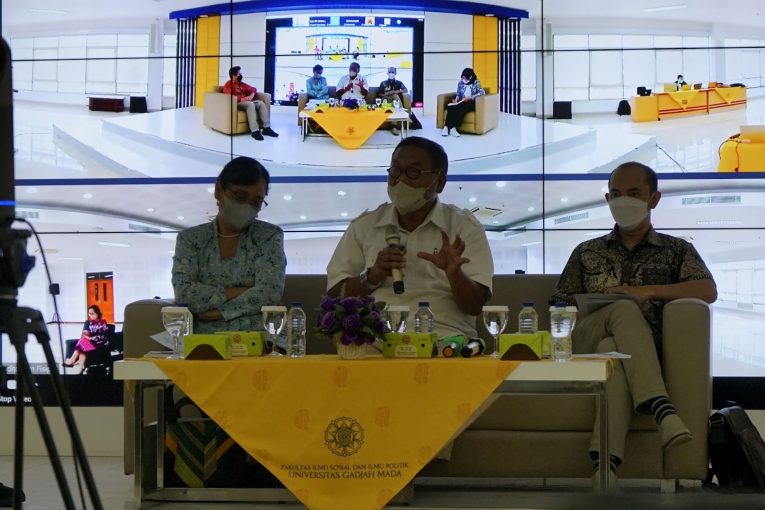
Yogyakarta, August 30th 2022─The Department of Public Policy and Management of Faculty of Social and Political Sciences (DMKP FISIPOL) UGM held a book review of Membaca Tamansiswa dari Dekat (Budaya Organisasi di Tamansiswa) on Tuesday (30/8) in the BB Auditorium Room, 4th Floor, FISIPOL UGM. Ria Putri Palupijati, the author of ‘Membaca Tamansiswa dari Dekat (Budaya Organisasi di Tamansiswa)’, was here to explain the contents of her book. Sri Ratna Saktimulya, Head of UGM Center for Cultural Studies; Tri Suparyanto, lecturer at the Faculty of Economics at the University of Sarjanawiyata Tamansiswa; and Ario Wicaksono, lecturer of DMKP FISIPOL UGM were present as responders.
Ria stated that the Membaca Tamansiswa dari Dekat (Budaya Organisasi di Tamansiswa) was her master’s thesis at DMKP FISIPOL UGM which was recorded. The writing of the thesis started with Ria’s interest in Javanese philosophy. “My interest in Javanese philosophy led me to become a museum ambassador,” explained Ria. As a museum ambassador, Ria was once placed in the Dewantara Museum, which later became the reason she is familiar with Tamansiswa.

Tamansiswa, according to Ria’s research, started with a passion to improve the soul and mentality of the Indonesian people through education. These values are essential in the progress of the Indonesian nation under colonial rule. “After it ended, the regeneration of Tamansiswa produced five ministers in eight cabinets during the Old Order era and members of the Central and Regional DPR in the New Order era,” explained Ria.
Now, according to Ria, Tamansiswa is developing into an educational institution that needs to improve. There are several cultural values in Tamansiswa that according to Ria need to be revitalized. “The culture of being ‘tidak tegaan’ (not having a heart to) in the style of Javanese culture, for example, is a culture that needs to be abandoned because it has a bad effect on the development of organizational professionalism,” said Ria. In addition to revitalizing its internal culture, according to Ria, Tamansiswa also needs to be transformed into a more inclusive social movement.
In line with Ria, Suparyanto conveyed several self-criticisms against Tamansiswa. According to him, Tamansiswa is lagging behind in terms of keeping up with the fast-paced developments of the modern era. “In the past, it was enough for Tamansiswa to develop the character of its students in accordance with Tamansiswa values. Now, Tamansiswa also has to improve students’ capabilities in addition to internalizing values,” Suparyanto explained.
Furthermore, according to Suparyanto, Tamansiswa needs to restructure its internal organization. “Tamansiswa civil servants need to be educated to improve the quality of its human resources. This also needs to be accompanied by gradual regeneration and cadreritation,” Suparyanto explained. In the context of organizational management, according to Suparyanto, Tamansiswa needs to build a strict accountability mechanism and outline the organization’s direction.
Responding to Tamansiswa’s internal problems, Ario reflected on the UGM context. “I think Tamansiswa and UGM both experience the ‘illusion of greatness’ in managing the organization,” said Ario. The illusion of greatness makes the two educational institutions tend to take their branding lightly. They feel that the institution is already big so it doesn’t need to be branded anymore. In fact, according to Ario, branding is a crucial element that needs to be done carefully these days.
Showing the illusion of greatness, Sakti stated that the past glory of an institution does not need to be romanticized. “Tamansiswa’s current focus is to follow and adapt to the development of the modern world,” explained Sakti. The ability to follow and adapt to the modern world, according to Sakti, is not only able to make Tamansiswa survive but is even able to restore its past glory.
